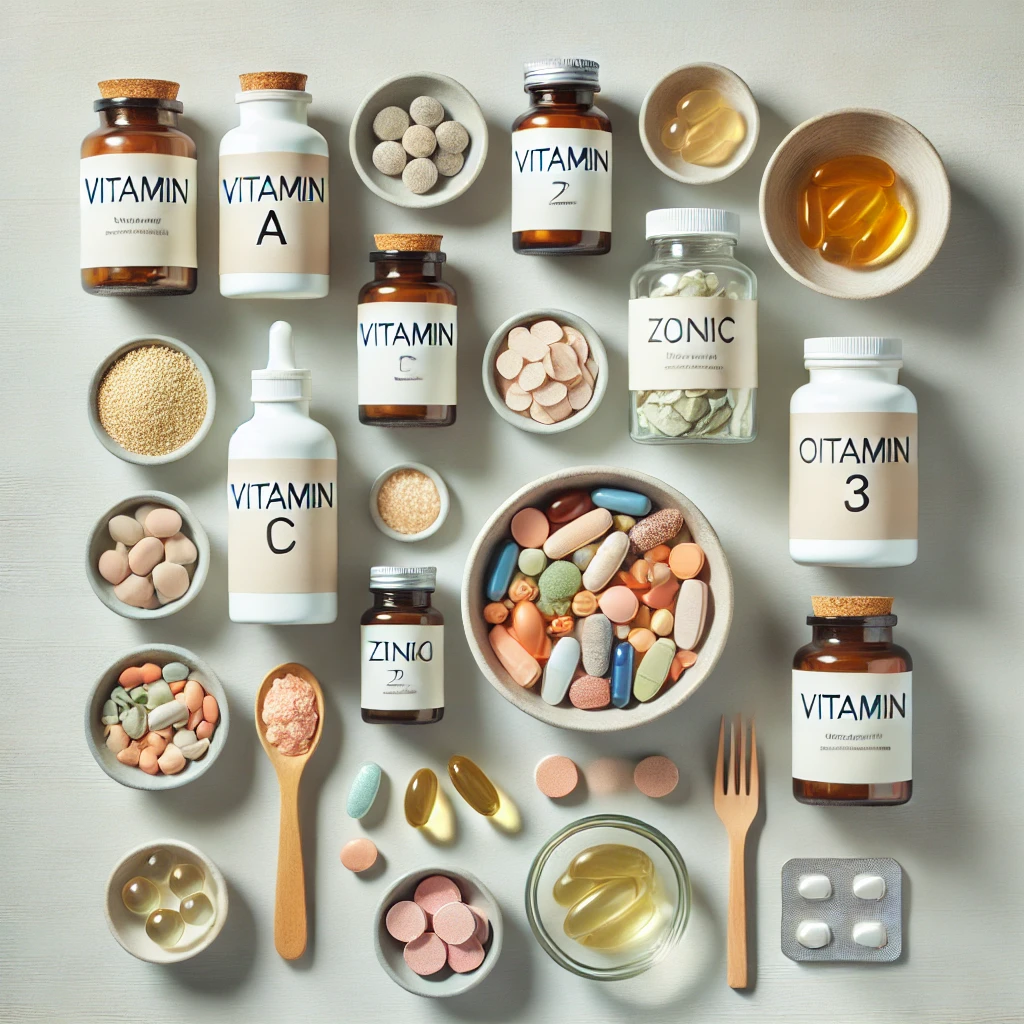Achieving clear skin starts from within. While topical treatments are helpful, nourishing your body with the right vitamins and minerals can greatly impact your skin’s health and appearance. Here are ten essential vitamins and minerals that contribute to clear, healthy skin, especially for those struggling with acne.
1. Vitamin A: Promotes Healthy Skin Cell Production
Vitamin A is crucial for maintaining skin health by encouraging cell turnover. It helps reduce the buildup of dead skin cells that can clog pores and lead to acne. In addition, Vitamin A promotes the healing of damaged skin, reduces the appearance of fine lines, and helps prevent acne breakouts. Retinoids, a form of Vitamin A, are commonly used in skincare products for their ability to speed up cell regeneration, making skin look fresher and clearer.
Food Sources: Sweet potatoes, carrots, spinach, and kale.
2. Vitamin C: Fights Free Radicals and Supports Collagen Production
Vitamin C is a powerful antioxidant that protects your skin from damage caused by free radicals, which are unstable molecules that can harm cells. Free radicals are often produced by exposure to UV light, pollution, and stress. In addition, Vitamin C plays a vital role in collagen production, which is essential for skin elasticity and firmness. It also helps lighten hyperpigmentation and acne scars, making it a go-to for brightening skin tone.
Food Sources: Citrus fruits, strawberries, bell peppers, and broccoli.
3. Vitamin E: Acts as an Antioxidant and Helps with Skin Repair
Vitamin E is another antioxidant that works to protect the skin from environmental damage, including pollution and sun exposure. It helps to nourish and repair damaged skin tissues, keeping it soft and hydrated. Vitamin E is especially effective when combined with Vitamin C, as they work synergistically to enhance each other’s antioxidant properties. This vitamin is often found in moisturizers due to its ability to hydrate and repair dry, flaky skin.
Food Sources: Almonds, sunflower seeds, hazelnuts, and spinach.
4. Vitamin D: Reduces Inflammation and Helps with Cell Turnover
Often called the “sunshine vitamin,” Vitamin D is crucial for maintaining healthy skin. It reduces inflammation and supports skin cell turnover, helping to remove dead cells and promote the growth of new ones. Vitamin D deficiency has been linked to several skin issues, including acne. Ensuring adequate Vitamin D levels can help reduce the severity of breakouts and promote overall skin health.
Food Sources: Fatty fish (like salmon and mackerel), fortified dairy products, and exposure to sunlight.
5. Zinc: Regulates Oil Production and Heals Acne Scars
Zinc is an essential mineral that plays a key role in regulating oil production, which is particularly important for those with acne-prone skin. It helps reduce the amount of oil your skin produces, thereby lowering the risk of clogged pores and acne. Zinc also promotes wound healing and can help reduce the appearance of acne scars. Additionally, it has anti-inflammatory properties that calm irritated skin and reduce redness.
Food Sources: Oysters, beef, pumpkin seeds, and lentils.
6. Selenium: Protects Skin from Free Radical Damage
Selenium is a mineral that, like Vitamins C and E, acts as an antioxidant. It helps protect the skin from oxidative stress and damage caused by free radicals. Selenium also plays a role in reducing inflammation and can support the skin in healing from acne lesions. Adequate selenium levels have been linked to better skin elasticity and fewer wrinkles, making it an essential mineral for maintaining youthful, clear skin.
Food Sources: Brazil nuts, tuna, eggs, and whole grains.
7. Omega-3 Fatty Acids: Reduce Inflammation and Improve Hydration
Omega-3 fatty acids are essential fats that the body cannot produce on its own, so they must be obtained through diet. They are known for their anti-inflammatory properties, which can help reduce acne-related swelling and redness. Omega-3s also help keep the skin hydrated by supporting the skin barrier, which retains moisture. These fatty acids can improve the appearance of acne-prone skin by reducing inflammation and boosting overall hydration.
Food Sources: Salmon, flaxseeds, walnuts, and chia seeds.
8. Biotin: Supports Skin, Hair, and Nail Health
Biotin, also known as Vitamin B7, is often associated with hair health, but it also plays a role in maintaining healthy skin. A deficiency in biotin can lead to dry, scaly skin and exacerbate skin conditions like acne. While biotin is essential for skin health, it’s important to note that excessive biotin supplementation has been linked to acne in some individuals, so it’s best to stick to natural sources or moderate doses.
Food Sources: Eggs, almonds, avocados, and sweet potatoes.
9. Niacinamide (Vitamin B3): Reduces Redness and Irritation
Niacinamide, a form of Vitamin B3, has become a popular ingredient in skincare due to its ability to calm inflammation and irritation. It helps strengthen the skin’s barrier function, reducing redness and blotchiness often caused by acne. Niacinamide is also effective in regulating oil production, minimizing the appearance of pores, and improving skin texture. It’s gentle on the skin, making it a great option for all skin types, including sensitive skin.
Food Sources: Chicken, turkey, tuna, and mushrooms.
10. Folic Acid: Promotes Healthy Cell Growth and Renewal
Folic acid, or Vitamin B9, plays an important role in healthy cell production and skin renewal. It helps maintain the skin’s overall health by promoting the formation of new cells and ensuring they function properly. Folic acid also contributes to a healthy glow and can help prevent skin issues like acne by promoting detoxification and reducing inflammation in the body.
Food Sources: Leafy greens, asparagus, legumes, and fortified cereals.
Conclusion
Incorporating these vitamins and minerals into your diet can have a significant impact on the health and clarity of your skin. While topical treatments address the surface, nourishing your body from within with the right nutrients is essential for maintaining clear, glowing skin. Whether you’re targeting acne or looking to enhance your skin’s overall radiance, these essential nutrients are a great place to start.

